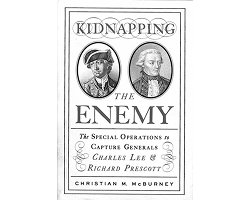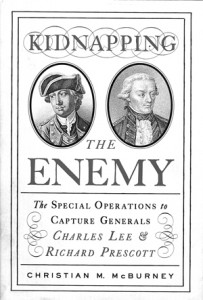
 copyright the Chronicle March 5, 2014
copyright the Chronicle March 5, 2014
Kidnapping the Enemy, The Special Operations to Capture Generals Charles Lee & Richard Prescott, by Christian M. McBurney. 325 pages. Hardcover. Published by Westholme Publishing, LLC. $29.95.
Reviewed by Tena Starr
It was 1777 and the American war for independence wasn’t going particularly well. George Washington’s competence had been called into question, and his second-in-command, General Charles Lee, had just been captured by the British in a daring dragoon raid that found Lee caught off guard.
The difficult General Lee had apparently abandoned caution in favor of comfort and may have left himself vulnerable in order to spend the night with a woman. But no matter the cause of his capture, some considered him, a former British officer, the hope of the American Revolution. He had military experience that Washington didn’t, and his record, at least militarily, had been a shining one, although Washington himself considered the man’s temper, and general nastiness, a detriment.
The fledgling nation desperately sought Lee’s release. It could not be procured, however, unless the Americans had a prisoner of equal stature to exchange.
At the time, William Barton — who would go on to found Barton, Vermont — was a lieutenant colonel, relatively unknown at 29, but energetic. He was born in Warren, Rhode Island, a seafaring village, where he became a hatter.
He was apparently robbed a couple of times — the first costing him “five new beaver hats, not colored; one second hand hat in the new fashion; and one cloth surtout [coat] with basket buttons,” says author Christian McBurney.
When war broke out, Barton, who was a firm patriot, joined a Providence militia company as a corporal.
He was powerfully built with a wide body, a big head, and a square jaw, and he proved to be a natural leader who quickly rose in rank, says McBurney. In August of 1775, he was appointed adjutant of a Providence County militia regiment. Then he was named captain of a company.
“His patriotic fervor was so strong that he named his third son, born in February 1776, George Washington Barton,” says McBurney.
William Barton was apparently a thinker as well as a patriot, and he took it upon himself to come up with a plan for the release of General Lee. His idea was to kidnap the British General Richard Prescott at a farmhouse where the officer, much hated by Americans, had taken to spending the nights.
On the night of July 10, 1777, Barton led his small, hand-picked group in whaleboats across Narragansett Bay to Newport, Rhode Island. The town was occupied by more than 3,000 enemy soldiers, but Barton stealthily led his men up a hidden path to the farmhouse where General Prescott slept (apparently another general who was more interested in his sex life than in military discipline).
Barton’s group managed to seize the sleeping general, then returned to their waiting boats without a shot fired. The Americans reached the mainland safely with Prescott in tow and finally had a bargaining chip. It was a stunning coup that took even those who’d sanctioned it by surprise.
Here is Joseph Stanton, Barton’s superior, writing to Rhode Island Governor Nicholas Cooke:
“I most sincerely congratulate your honor on the success of Colonel Barton and at the same time feel a peculiar pleasure in being in the least degree accessory in the forming of the plan with Colonel Barton to take General Prescott. The officers for the expedition were well chosen and the plan of attack well executed. History scarcely effects such an instance and it must be a most mortifying scene to General Prescott when he reflects that he was taken on an island in the midst of the British fleet and his army and that without the discharge of a single gun.”
Why anyone wanted either of these generals, on either side, is something of a mystery since they were both unsavory fellows, to put it rather mildly.
Lee, in his captivity, had concluded that the Americans couldn’t win the war and tried to negotiate with the British for peace, though he had no authority to do so. He also seems to have been an arrogant and irascible man who chafed at Washington’s superior position and not only sidestepped orders, but was also fond of insulting the American general’s competence.
For his part, Prescott was mean-spirited with a reputation for treating American prisoners of war so abominably that they died in droves. Notably, he made the life of Ethan Allen, of the Green Mountain Boys, pure hell, chaining him, deporting him, and nearly ruining his health. Prescott wasn’t even beloved by the British, who considered his capture not much of a loss.
Nonetheless, under the rules of war at the time, Barton had done a remarkable thing by capturing Prescott, who could then be exchanged for Lee. At least some believed Lee would turn the Revolution around for the better.
That’s not what happened. It turned out that, in the absence of Lee’s guidance, George Washington stopped second-guessing himself and proved to be a pretty good military tactician in his own right — to the point where at least one British officer suggested that capturing Lee, and leaving Washington to his own devices, was one of the worst ideas the British had ever had.
In the end, when Lee was finally returned to military command in the United States, he was sacked for failing to pursue an attack. It’s possible his treatment was unfair, but he’s not an easy man to like, given his waffling about the fortunes of the war, as well as his own allegiance, his contempt for George Washington, his blatant self-interest, and his rather puffed up opinion of himself.
But this story is mainly about William Barton’s fortunes, and it isn’t his fault that Lee turned out to be a disappointment. He conducted a stunning raid, kidnapped a prominent British general, and thus made possible the exchange the Americans sought. He was widely considered a national hero.
What happened to Barton thereafter is puzzling.
The author suggests he was smitten by hubris, given his exploits. Barton ended up with a serious wound in the course of his military service, which led to him petitioning the government for redress — he would never be quite able again.
He received it, to some extent — there was no question that his contribution to the war had been significant. In fact, he was among 14 American soldiers who received fabulous, French-made swords for his service.
Part of his compensation was a land grant in Vermont. In 1778, Barton, along with Ira Allen and John Paul Jones, both war heroes, was given 36 square miles of land in Vermont, and the name of the planned town was changed from Providence to Barton in his honor. William Barton was one of the few grantees to actually settle in Barton, arriving in 1794.
What followed was a legal battle over the land that was so murky, dragged out, and convoluted that even the book’s author admits to not thoroughly grasping it. The upshot was that Barton ended up spending more than 13 years in Danville, in debtor’s prison. Orleans County court records indicate that he owed a mere $320, which he could have paid, McBurney writes. He concludes that it was pride, as well as an injured sense of justice, that kept Barton from freeing himself.
“I have made up my mind a long time since that the world shall never say that I was the first man who paid for lands that was [already paid for and] deeded to him,” Barton wrote.
In a letter to former U.S. Senator Dudley Chase, he wrote: “Permit me to say that I fought for a government of equal rights. The poor should have the same justice as the rich.”
In the end, it was the Marquis de Lafayette who rescued the aggrieved and stubborn former war hero. On a U.S. tour, Lafayette heard of his old friend’s plight and before returning to France he paid Barton’s debts.
Kidnapping the Enemy is a compelling story in its own right, but even more so for anyone with an interest in the founder of the town of Barton. After his release from prison, Barton was treated as a national hero, one of the last surviving heroes of the Revolutionary War. By the time of his death, in 1831, Barton’s capture of General Prescott had become a nationally honored event.
“Only with the coming of the Civil War, and the countless incidents of bravery and horror associated with that national conflict, did Barton’s legendary capture of Prescott begin to fade from public consciousness,” McBurney concludes.
contact Tena Starr at [email protected]
For more free articles from the Chronicle like this one, see our Reviews pages. For all the Chronicle’s stories, pick up a print copy or subscribe, either for print or digital editions.







